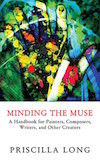Creativity
Are Self-Esteem and Creativity Connected?
"Minding the Muse," new book about creativity, explores the artist's life.
Posted September 27, 2016
Contributed by Priscilla Long, author of Minding the Muse.
Improving self-esteem is a matter of taking regular steps, no matter how small, to set goals to achieve what you intend to achieve, to live the life you aspire to live, to live according to your values and according to your dreams. It’s a matter of working in regular small steps to create the art you dream of leaving in the world once you are gone.

I look back a long way to when I was a young woman dreaming of becoming a writer. In my twenties, I wrote poems; I wrote in my journal. I began researching the labor organizer Mother Jones and the history of coal mining. I was a political activist working to end the war in Vietnam, to “bring the boys home.” I worked in the women’s movement (1969–1972) and later in the movement for peace and justice in the Middle East. I was a reader, I had good friends, and I entered the printing trade. I was good at what I did, but ever-anxious to please. I did not have confidence in my writing. Most of us don’t at that stage. I could not put my writing first.
Two “self-help” books were transformative, and perhaps they dropped into my life at a time when I was receptive to their wisdom. One was The New Diary by Tristine Rainer. I spent many hours one dark winter, a time of longing and depression, working on the exercises in that mensch of a book. The other was Becoming a Writer by Dorothea Brande. Brande requires you to write for fifteen minutes every day. I read her book in 1980 and that’s about when, notwithstanding previous writings and early publications, I became a real writer. Or so it seems to me. Every day since, I’ve put in my fifteen minutes. Usually more, virtually never less.
Self-esteem is not a fixed quantity. Rather it’s a feeling, fluid and changing. But I can say that over the years, with a little help from my friends, with a little help from a couple of good therapists, with a little help from a couple of good self-help books, I’ve evolved into a writer who has consistently high self-esteem. It helps me to be productive, to get my work out, to keep working on my work. It gives me resilience in the work.
You have what it takes to make art, if you make the choice to take what it takes. None of us knows whether our work will end up being great or not great, remembered or forgotten. But we are in control of that steady work process that is engendered by believing in our selves and in our lives and by respecting the work we have undertaken.
Sustaining creative work requires respecting yourself, honoring your life, and the humility and faith to keep going despite the ambiguity of creative work and the lack of guarantees regarding either artistic outcome or recognition. Honor yourself and your work as if the world depended on it.
The world does depend on it.
Note: This is an excerpt from Minding the Muse: A Handbook for Painters, Composers, Writers, and Other Creators (Coffeetown Press, $13.95, 128 pages, ISBN: 978-1-60381-363-1).
Priscilla Long is a Seattle-based author and writer of science, poetry, history, fiction, and creative nonfiction. Her other books published in 2016 include Fire and Stone: Where Do We Come From? What Are We? Where Are We Going? and Crossing Over: Poems. Long’s MFA is from the University of Washington and she serves as Founding and Consulting Editor of www.historylink.org, the online encyclopedia of Washington state history.


